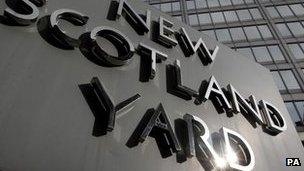Is London setting the example for police commissioners?
- Published

When the Conservatives said they wanted to proceed with police commissioners in 2010 they held London's mayor as the pathfinder for the elected model.
A few weeks later Boris Johnson announced he was stepping down from chairing the Metropolitan Police Authority (MPA), then the existing symbol of elected control over the police, and putting a deputy mayor in his place.
Some saw it at the time as an odd rejection of his party's message.
It is the office of mayor not the individual who does the setting of priorities and holds the UK's biggest police force to account.
Obvious and simple
In effect it will be an appointed - not elected - deputy mayor, Stephen Greenhalgh, who will be the details-man who dictates the pace for the Met.
If the central idea of elected commissioners is to create a transparent chain of accountability, in London it may take some time for its shape to pervade public consciousness.
At one level, it is obvious and simple. The mayor is and will be judged on the level of crime, and the effectiveness of the police in the capital, so it is incumbent on the mayor to take a big interest in how they set about their task.
On the other hand, sceptics suggest that recent changes in London police governance render arrangements more opaque and the chain twisted.
The former MPA - which consisted of elected London Assembly members and independent members - was abolished this year to be replaced by the Mayor's Office of Policing and Crime (MOPAC).
Deputy Mayor Stephen Greenhalgh had an uncertain start, in public at least. He over-ruled the desire of the London Assembly at an early meeting to question the real commissioner Bernard Hogan-Howe, telling him he did not need to appear.
It seemed at the time an avoidable embarrassment, but in fact highlighted how the new "accountability" chain is meant to work.
No publicity
Mr Greenhalgh has appointed a coterie of experts who will manage MOPAC and set challenges and priorities for the Met.
He by turn will be answerable to a police committee of the assembly - it will hold Mr Greenhalgh to account for how he is holding the police to account.
The shape of things to come was outlined with the first "challenge" meeting at the beginning of October, where Mr Greenhalgh presented his priorities to Met Police Commissioner Bernard Hogan-Howe at City Hall.
It was billed as a public meeting yet there had been no publicity about the session and the chamber was nearly empty.
Mr Johnson made no attempt to disguise the stage-managed nature of this inaugural session, saying he would not pretend that the commissioner did not know the questions he was about to be asked.
However, it will certainly be refined and could at least come to be an important forum for disseminating the complexities of policing to the council tax-paying public.
At the meeting Mr Greenhalgh set the Met a '20-20-20 challenge' - to cut crime, boost public confidence and cut costs, all by 20% over the next four years.
There was one particular exchange which offered a wider insight about the potential negotiation - and tension - which could lie ahead with this new democratic policing model, given the likely competing priorities and tight finances.
But the true test will come when both the Met and mayor find themselves with their backs against the wall.